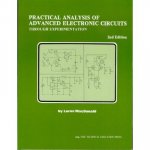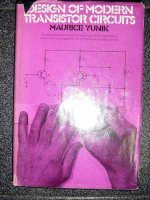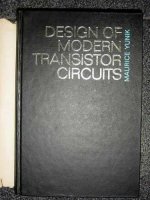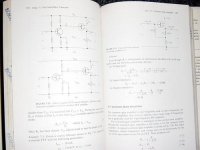I have looked through copies of both Douglas Self's power amp design book and the book "High Power Audio Amplifier Construction Manual" by G. Randy Slone, and I get the feeling that even after reading one of them I will still not have the foggiest idea of how to go about designing my own amplifier. They don't really appear to be design handbooks per se, but more like books detailing the author's own philosophies towards design of "the best" amplifier. There are very few equations in either of them, unlike say the great "RF Circuit Design" by Chris Bowick. Are there any other solid state audio amplifier design books that anyone on the forum would recommend - preferably with more equations? The previous two books would probably be a lot more helpful once one is able to build _a_ amplifier - then I can go back and read those and find out how to build "the best" amplifier. Something like the material on the ESP web page would be great, unfortunately that set of small articles just isn't comprehensive enough.
Hi,
most of the equations you need you will find in Wikipedia in the articles about common emitter, common collector and common base circuits. There you find the equations for gain (voltage/current) which allows you to understand the building blocks.
Putting the building blocks on top of eachother and then you will probably want to get distortion down and you can do that by using negative feedback, that is closing the loop. There is also an article in Wikipedia on that topic.
At some point the whole thing will be no longer stable and you may want to read about stability and compensation. Wikipedia is also your friend, as are (free) application notes by Ron Mancini from Texas Instruments.
I am not aware of a 1-2-3 step book for amp design, but putting an amp together is really not so difficult and you will get pretty far by reading above articles.
Self's books are intended to read after these articles.
Have fun, Hannes
most of the equations you need you will find in Wikipedia in the articles about common emitter, common collector and common base circuits. There you find the equations for gain (voltage/current) which allows you to understand the building blocks.
Putting the building blocks on top of eachother and then you will probably want to get distortion down and you can do that by using negative feedback, that is closing the loop. There is also an article in Wikipedia on that topic.
At some point the whole thing will be no longer stable and you may want to read about stability and compensation. Wikipedia is also your friend, as are (free) application notes by Ron Mancini from Texas Instruments.
I am not aware of a 1-2-3 step book for amp design, but putting an amp together is really not so difficult and you will get pretty far by reading above articles.
Self's books are intended to read after these articles.
Have fun, Hannes
Try Gray and Meyer
You might like "Analysis and Design of Analog Integrated Circuits", by Paul Gray and Robert Meyer...an older edition would be fine, maybe better for what you seek...checking my edition from 1977, we see:
chapter 3-single transisotr and trwo transisotr amplifiers
chapter 4-transistor current sources and active loads
chapter 5 - output stages
chapter 6 - op amps
chapter 7 - freq response of integrated circuits
chapter 8 - feedback
chapter 9 - freq response and stability of feedback amplifiers
Newer editions have similar stuff, but maybe more focus on MOSFET, rather than bipolar design...my newer copy is at work, so I couldn't say for sure...
Good Designing...
Dan
You might like "Analysis and Design of Analog Integrated Circuits", by Paul Gray and Robert Meyer...an older edition would be fine, maybe better for what you seek...checking my edition from 1977, we see:
chapter 3-single transisotr and trwo transisotr amplifiers
chapter 4-transistor current sources and active loads
chapter 5 - output stages
chapter 6 - op amps
chapter 7 - freq response of integrated circuits
chapter 8 - feedback
chapter 9 - freq response and stability of feedback amplifiers
Newer editions have similar stuff, but maybe more focus on MOSFET, rather than bipolar design...my newer copy is at work, so I couldn't say for sure...
Good Designing...
Dan
No quick answer I'm afraid... as to being able to design an amp, as years of experience come into play... in all fields, design, PSU, wiring layout etc
This was a good book I seem to remember,
The art of electronics - Google Books
This was a good book I seem to remember,
The art of electronics - Google Books
Some more books
Depending on where you are in your reading, this old, out of print book might be handy:
How to Build and Use Electronic Devices Without Frustration Panic Mountains of Money or an Engineer Degree, by Stuart Hoenig
This one, also out of print, really takes you step by step through a lot of the design stuff...If it's your first time through this, you may find it valuable and accessible...
Practical Transistor Circuit Design and Analysis by Gerald E. Williams (Hardcover - Sep 1973)
Both are available used on Amazon
Depending on where you are in your reading, this old, out of print book might be handy:
How to Build and Use Electronic Devices Without Frustration Panic Mountains of Money or an Engineer Degree, by Stuart Hoenig
This one, also out of print, really takes you step by step through a lot of the design stuff...If it's your first time through this, you may find it valuable and accessible...
Practical Transistor Circuit Design and Analysis by Gerald E. Williams (Hardcover - Sep 1973)
Both are available used on Amazon
I would include:
"High Performance Audio Power Amplifiers" by Ben Duncan published by Newnes
I don't know if it is easy to find, a quick search didn't show up much.
Amazon does list it (last one?).
Amazon.com: High Performance Audio Power Amplifiers (9780750626293): Ben Duncan: Books
There is something on-line (ebook?)
RapidShare: 1-CLICK Web hosting - Easy Filehosting
It is a general overview, so it may not be a good tutorial to design an amp for yourself, but it is an easy read (except for Ch. 4 which is well worth the slog) and very enlightening as to the real problems encountered by power amps. It definitely makes you more sophisticated about amp design. It also described the major design elements to date.
Found it:
http://www.elsevierdirect.com/product.jsp?lid=0&iid=73&sid=0&isbn=0750626291
"High Performance Audio Power Amplifiers" by Ben Duncan published by Newnes
I don't know if it is easy to find, a quick search didn't show up much.
Amazon does list it (last one?).
Amazon.com: High Performance Audio Power Amplifiers (9780750626293): Ben Duncan: Books
There is something on-line (ebook?)
RapidShare: 1-CLICK Web hosting - Easy Filehosting
It is a general overview, so it may not be a good tutorial to design an amp for yourself, but it is an easy read (except for Ch. 4 which is well worth the slog) and very enlightening as to the real problems encountered by power amps. It definitely makes you more sophisticated about amp design. It also described the major design elements to date.
Found it:
http://www.elsevierdirect.com/product.jsp?lid=0&iid=73&sid=0&isbn=0750626291
Last edited:
in this case this thread could be of interest:
http://www.diyaudio.com/forums/soli...io-amplifier-books-overview-google-books.html
http://www.diyaudio.com/forums/soli...io-amplifier-books-overview-google-books.html
IMHO, many of these books tell you basics or give a collection of circuits, without explanations and being specific on sonic performances and trade-offs. Also little if anything on active devices & passive component choices, specific pros and cons for certain circuit techniques (like cascode, folded cascode, .....) IMHO you are better off reading Nelson Pass and other Guru s on the forum.
Perhaps one day, the likes of Nelson, John, Bob, Scott, ..... would care to pass on their life-long experience by writing a book. That would certainly be the greatest gift for the next generation.
Patrick
Perhaps one day, the likes of Nelson, John, Bob, Scott, ..... would care to pass on their life-long experience by writing a book. That would certainly be the greatest gift for the next generation.
Patrick
I learned the basic stuff from a generic book discussing analog electronics. They usually have at least one chapter that covers the basic power amplifier topology (input stage + voltage amplifier + emitter follower push-pull current amp output). Art of electronics, for example, has a pretty good tutorial. After becoming familiar with that stuff Self's book began to open up much more efficiently.
I also liked Ben Duncan's book about amplifiers (High Performance Audio Power Amplifiers). Yet, it really doesn't teach any designing or alike. It's more a generic overview of circuit topologies but discusses many topics that Self (and Slone) omitted. Many of those are in wide use, such as OpAmp -based voltage amplifiers or inputs.
I also "schematic surf" and usually seeing the stuff that books discuss in theory put into action in actual circuits helps to understand the overall scheme much better. Tools like SPICE simulations may also help to open up the theoretical bits.
I think it's overall a pretty individual process for everyone. Not all books suit each individual. For example, the ones that are too math oriented in teaching how things work don't really open up to me. If the same principle is discussed in plain words (instead of some complex equation) I have a much better chance to understand it - and possibly then later also learn what the deal with the complex equation was as well.
I also liked Ben Duncan's book about amplifiers (High Performance Audio Power Amplifiers). Yet, it really doesn't teach any designing or alike. It's more a generic overview of circuit topologies but discusses many topics that Self (and Slone) omitted. Many of those are in wide use, such as OpAmp -based voltage amplifiers or inputs.
I also "schematic surf" and usually seeing the stuff that books discuss in theory put into action in actual circuits helps to understand the overall scheme much better. Tools like SPICE simulations may also help to open up the theoretical bits.
I think it's overall a pretty individual process for everyone. Not all books suit each individual. For example, the ones that are too math oriented in teaching how things work don't really open up to me. If the same principle is discussed in plain words (instead of some complex equation) I have a much better chance to understand it - and possibly then later also learn what the deal with the complex equation was as well.
Doug Self is totally biased as he does not like FETs.
Ask Nelson Pass, John Vurl or Erno Borbely, and they will tell you different.
Patrick
I agree on that! Ofcourse you ment John Curl.
it doesn't matter what Mr Self likes or not.
Regards
I don't read the Self book that way. Imho he provides an analysis of a simplified example amplfier. Understanding that analysis is the key to design your own amp, and than you can use mosfets, fancy circuits etc.They don't really appear to be design handbooks per se, but more like books detailing the author's own philosophies towards design of "the best" amplifier.
Regards
There is a fine book in German about silicon transistors and operational amplifiers:
Halbleiter-Schaltungstechnik
(loosely translated: "Solid State Circuit Design" or "Semiconductor Circuit Topologies"
go to follow URL's:
Tietze-Schenk Homepage
Halbleiter-schaltungstechnik - Ulrich Tietze, Christoph Schenk - Google Books
reading samples you will find about
Halbleiter-Schaltungstechnik - Ulrich Tietze, C. Schenk, Christoph Schenk - Google Bücher
I am looking for this book in the English language to improve my english.
Exist the same book in the English language?
If not, which books in that kind exist in the English and the German language at the same time?
Halbleiter-Schaltungstechnik
(loosely translated: "Solid State Circuit Design" or "Semiconductor Circuit Topologies"
go to follow URL's:
Tietze-Schenk Homepage
Halbleiter-schaltungstechnik - Ulrich Tietze, Christoph Schenk - Google Books
reading samples you will find about
Halbleiter-Schaltungstechnik - Ulrich Tietze, C. Schenk, Christoph Schenk - Google Bücher
I am looking for this book in the English language to improve my english.
Exist the same book in the English language?
If not, which books in that kind exist in the English and the German language at the same time?
I have looked through copies of both Douglas Self's power amp design book and the book "High Power Audio Amplifier Construction Manual" by G. Randy Slone, and I get the feeling that even after reading one of them I will still not have the foggiest idea of how to go about designing my own amplifier.
I have three recommends:
Design of Modern Transistor Circuits by Maurice Yunik. Good reference for BJTs, but you can skip the sections on FETs (Doesn't really know what he's discussing.) Same goes for the chapter on audio power amps.
Practical Analysis of Amplifier Circuits Through Experimentation Vol I -- excellent material for designing with BJTs.
Practical Analysis of Amplifier Circuits Through Experimentation Vol II -- really good material on JFETs and enhancement/depleation MOSFETs. Also good discussion on the design of power supplies and active regulators.
All of these are older material, but the essentials haven't changed. Once you get that material, then the other sources you mentioned will make more sense.
Also, never forget that the devil's always in the details, and there are a lot of other factors that can make or break any design.
"Guru's" don't necessarily have the "last word", and you'll have to decide for yourself what end results please you. That means be prepared to ditch some circuit boards and start over. There really is no substitute for experience.
Ahh, this is actually a commom problem, not many people remember what it is like to be a beginner, or perhaps they enjoy being cognoscenti too much.
I once came across an excellent book on the subject, on of a series of ‘how to’ books with yellow and black covers, unfortunately I just can’t remember the title, I no longer have the book and I think it’s out of print.
Building an amplifier starts with this question: how much power do you want to get out of it?
The second question is: what is the load? (Speakers, antenna, ultrasound transducer?)
These 2 things tell you a lot.
They tell you the voltage of the power supply.
Suppose you have 8 ohm speakers. You want 10 watts.
The power in a load is V * V / Z, where Z is the impedance and V is the RMS voltage.
So in our case V^2 / Z = 10. Z = 8 so V^2 = 80, and V = sqrt(80) or ~9v (RMS).
9v RMS is ~12.7v peak, or ~25v peak-to-peak (capital V is usually used for DC values, and lower case for instantaneous, but I’m not going to fuss about that too much here).
So you know that your power supply must be about 27V (allowing for some losses) if single ended, or +/- 13.5V if the amplifier is push-pull.
If you don’t know what RMS, peak and peak-to-peak mean in this context, you can educate yourself on the net.
OK, similarly the power can be calculated as I * I * Z = 10W. I * I =10/8 or 1.25A (or a r.m.s.). So now you can calculate the peak current.
Now we know a couple of things about the output transistors. We know the collector-emitter voltage they must withstand, and we know the peak current they must pass.
We know some other things about the transistors, we know the frequencies they must deal with. Obviously if we’re building an RF amplifier, we must pick ones that still have gain at the frequencies we want to operate. The highest frequency at which a transistor has gain is called the transition frequency or f(sub t). You can find this in the datasheet.
Of course all transistors work at audio frequencies, but we don’t really want RF transistors, because they’re more expensive, and they’re more difficult to design with as they are more prone to oscillation.
Having picked a transistor we’re in a better position to design the previous stage, because we will know its gain, (current gain, h(sub fe))and the current required to drive it. Eventually we will arrive at a stage where the voltage and current required to drive it are no more than those available from whatever source we have.
I can’t obviously present a complete tutorial on amplifier design here, it would be too much effort, there are many configurations in which active devices can be employed and other considerations , but hopefully this will give you a clue as to how to dimension and choose the devices to build a basic amplifier.
I wrote this quickly, I hope there aren't any errors, doubtless someone will point them out if there are.
I once came across an excellent book on the subject, on of a series of ‘how to’ books with yellow and black covers, unfortunately I just can’t remember the title, I no longer have the book and I think it’s out of print.
Building an amplifier starts with this question: how much power do you want to get out of it?
The second question is: what is the load? (Speakers, antenna, ultrasound transducer?)
These 2 things tell you a lot.
They tell you the voltage of the power supply.
Suppose you have 8 ohm speakers. You want 10 watts.
The power in a load is V * V / Z, where Z is the impedance and V is the RMS voltage.
So in our case V^2 / Z = 10. Z = 8 so V^2 = 80, and V = sqrt(80) or ~9v (RMS).
9v RMS is ~12.7v peak, or ~25v peak-to-peak (capital V is usually used for DC values, and lower case for instantaneous, but I’m not going to fuss about that too much here).
So you know that your power supply must be about 27V (allowing for some losses) if single ended, or +/- 13.5V if the amplifier is push-pull.
If you don’t know what RMS, peak and peak-to-peak mean in this context, you can educate yourself on the net.
OK, similarly the power can be calculated as I * I * Z = 10W. I * I =10/8 or 1.25A (or a r.m.s.). So now you can calculate the peak current.
Now we know a couple of things about the output transistors. We know the collector-emitter voltage they must withstand, and we know the peak current they must pass.
We know some other things about the transistors, we know the frequencies they must deal with. Obviously if we’re building an RF amplifier, we must pick ones that still have gain at the frequencies we want to operate. The highest frequency at which a transistor has gain is called the transition frequency or f(sub t). You can find this in the datasheet.
Of course all transistors work at audio frequencies, but we don’t really want RF transistors, because they’re more expensive, and they’re more difficult to design with as they are more prone to oscillation.
Having picked a transistor we’re in a better position to design the previous stage, because we will know its gain, (current gain, h(sub fe))and the current required to drive it. Eventually we will arrive at a stage where the voltage and current required to drive it are no more than those available from whatever source we have.
I can’t obviously present a complete tutorial on amplifier design here, it would be too much effort, there are many configurations in which active devices can be employed and other considerations , but hopefully this will give you a clue as to how to dimension and choose the devices to build a basic amplifier.
I wrote this quickly, I hope there aren't any errors, doubtless someone will point them out if there are.
Thanks for this URLYou is amusing guy : Tietze-Schenk Homepage
since when there is a German edition ??Hello
There's also:
Designing Audio Power Amplifiers, by Bob Cordell
Bye Gaetan
Thank you therefore.I have three recommends:
Design of Modern Transistor Circuits by Maurice Yunik. Good reference for BJTs, but you can skip the sections on FETs (Doesn't really know what he's discussing.) Same goes for the chapter on audio power amps.
Practical Analysis of Amplifier Circuits Through Experimentation Vol I -- excellent material for designing with BJTs.
Practical Analysis of Amplifier Circuits Through Experimentation Vol II -- really good material on JFETs and enhancement/depleation MOSFETs. Also good discussion on the design of power supplies and active regulators.
9780911908145: Practical Analysis of Amplifier Circuits Through Experimentation. 3rd Ed - AbeBooks - MacDonald, Lorne: 0911908145
Attachments
-
 Practical Analysis of Amplifier Circuits Through Experimentation, cover.jpg22.9 KB · Views: 290
Practical Analysis of Amplifier Circuits Through Experimentation, cover.jpg22.9 KB · Views: 290 -
 Design of modern Transistor circuits, cover.jpg23.1 KB · Views: 278
Design of modern Transistor circuits, cover.jpg23.1 KB · Views: 278 -
 Design of modern Transistor circuits, cover II.jpg23.9 KB · Views: 289
Design of modern Transistor circuits, cover II.jpg23.9 KB · Views: 289 -
 Design of modern Transistor circuits, sample.jpg24.3 KB · Views: 318
Design of modern Transistor circuits, sample.jpg24.3 KB · Views: 318
Last edited:
- Status
- This old topic is closed. If you want to reopen this topic, contact a moderator using the "Report Post" button.
- Home
- Amplifiers
- Solid State
- Best books for solid state design?